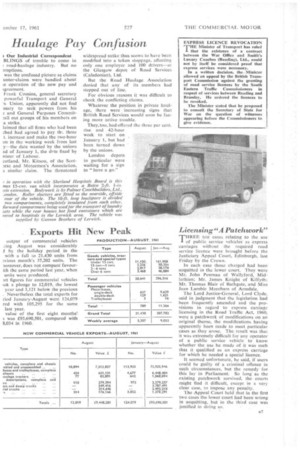Exports Hit New Peak
Page 41

If you've noticed an error in this article please click here to report it so we can fix it.
output of commercial vehicles ring August was considerably 3 by the holiday period in the with a fall to 21,430 units from viotis month's 37,202 units. The loreover, does not compare: favourith the same period last year, when units were produced.
art figures for commercial vehicles iok a plunge to 12,019, the lowest year and 3,121 below the previous . Nevertheless the total exports for Hod January-August were 124,079 red with 105,295 for the same last year, value of the first eight months' ; was £93,690,501, compared with f3,034 in 1960.
Licensing "A Patchwork"
THREE test cases relating to the use I of public service vehicles' as express carriages without the required road service licence were brought before the Justiciary Appeal Court, Edinburgh, last Friday by the Crown.
In each case those charged had been acquitted in the lower court. They were Mr. John Penman of Wallyford, Midlothian; Mr. James Knight of Kilfyth: Mr. Thomas Blair of Bath gate, and Miss Jean Lambie Meecharn of Armdate.
The Lord Justice-General, Lord -Clyde. said in judgment that the legislation had been frequently amended and the provisions in regard to express carriage licensing in the Road Traffic Act, 1960, were a patchwork of modifications on an original theme, the Modifications having apparently been made to meet particular cases as they arose. The result was that it was extremely difficult for any operator of a public service vehicle to know whether the use he made of it was such that it qualified as an express carriage for which he needed a special licence.
It seemed unfortunate, he said, if users could be guilty of a criminal offence in such circumstances, but the remedy for this lay in Parliament. So long as the existing patchwork• survived, the courts Might find it difficult, except in a very clear case, to impose any penalty.
The Appeal Court held that in the first two cases the lower court had been Wrong in acquitting, but in the third case was justified in doing so.




















































































































